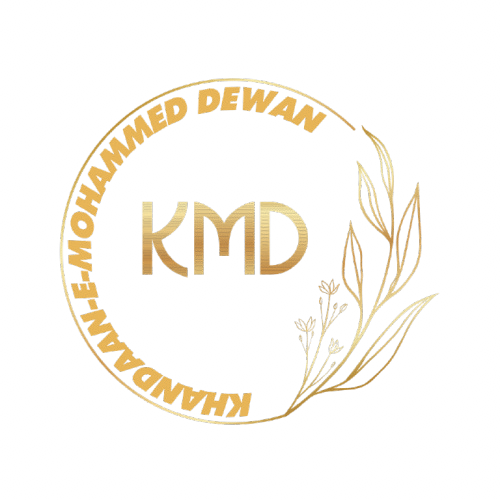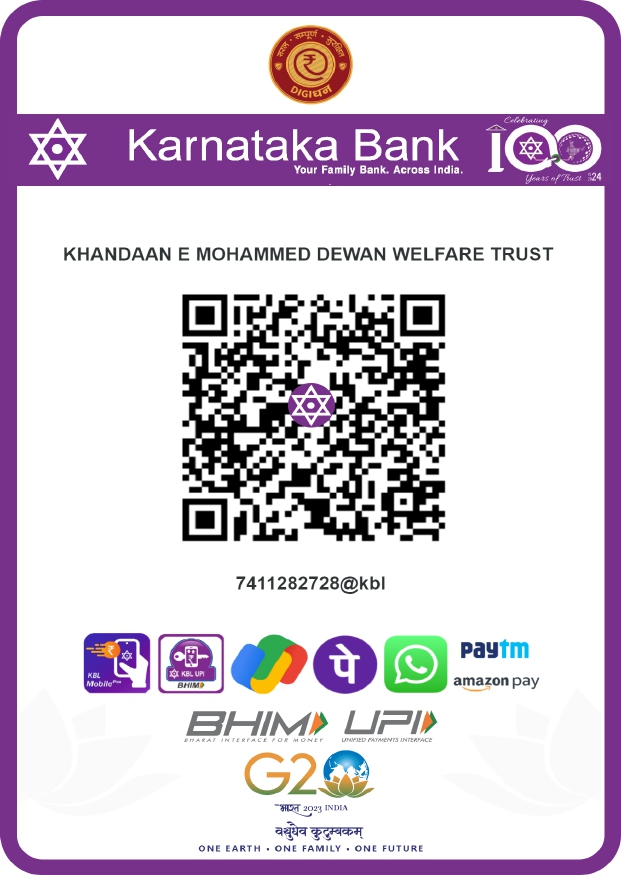About Khandaan-e-Mohammed Dewan Family
Our Roots, Our Legacy, Our Future
The Khandaan-e-Mohammed Dewan family traces its origins back to the historic village of Arehally, where our great-great-great-grandfather, Mohammed Dewan, fondly known as Hale Mane Sahukaar, laid the foundation for a lineage defined by resilience, wisdom, and integrity.
Mohammed Dewan was a distinguished coffee planter in Arehalli, and according to some sources, his ancestors were Patwegars who migrated from Bijapur. This heritage also led him to establish a successful clothing business, marking him as a renowned figure of his time.
A man who deeply valued family, Mohammed Dewan maintained strong family relations, inspired by the teachings of Prophet Muhammad (SAW) and the Quran. His commitment to keeping family ties strong and his generosity towards kin and compassion for the elderly are values that continue to guide us today.
A Brief History
After extensive research and inquiries with various elders in our family, we have identified three key points about our origins:
Bijapur Ancestry
Many elders confirmed that our family’s roots trace back to Bijapur. Our forefathers, including the ancestors of Mohammed Dewan, migrated from Bijapur to the Malenadu region. The primary reason for this migration was related to their profession, which was trading in clothes. Mohammed Dewan’s father, like many of our ancestors, sold clothes by traveling on horses and later bicycles, which led them to be known as Patwegars. Interestingly, even today, there are Patwegars still residing in Bijapur.
Mysore Connection and Migration
To further investigate our family’s history, the core committee members met with Sheikh Ali Sahib in Mysore. He confirmed that our family also has ties to Bijapur. Although no written records were available, he referenced a significant article connected to our family. This article mentioned that Mohammed Hussain, a prominent figure and the son-in-law of Dewan, played a key role in the construction of a Muslim hostel. The article praised the community for its dedication to education and service.
During the weakening of the Adil Shahi dynasty, which was based in Bijapur, Hyder Ali and Tipu Sultan took over and strengthened their rule by inviting skilled artisans, including the Patwegar clan, from Bijapur. The Patwegars were known for their craftsmanship, particularly in making military uniforms. When Tipu Sultan recognized their skills, he brought them to this region. However, after his martyrdom, the Patwegars faced difficulties in continuing their work and eventually migrated to the Malnad area.
Sheikh Ali Sahib further noted that this migration likely occurred around the mid-19th century during British rule. At that time, coffee cultivation was becoming prominent in the region, offering a new means of livelihood for Muslims. The Patwegar community spread across the villages of Hassan and Chikmagalur districts, engaging in coffee cultivation. They were known for being gentle, soft-spoken, pure-hearted, and righteous.
“One thing that should always be remembered is that at that time, coffee cultivation was exclusively in the hands of the British and Muslims.”
Tracing Our Roots to the Sahu Tribe and the Journey through Karnataka
A third narrative that has come to light traces our family’s origins to the era of Prithviraj Chauhan, during which two prominent tribes existed—one known as “Sahu” and the other as “Chauhan.” The “Sahu” tribe is believed to be the ancestors of our family, later becoming known as “Sahukar.” It is said that their lineage is connected to the Adil Shahi dynasty.
When the Adil Shahi rule weakened, four brothers from this lineage migrated from Bijapur, first settling in Yelahanka. After some time, they moved to Silgatta, then to Arkalgud, and eventually to Yeshloor. One of the brothers passed away in Yeshloor, where his grave is still believed to exist. From Yeshloor, they moved to Belgod and finally settled in Arehally, making it their central hub. Over time, various family members spread to different regions such as Mudigere, Chikmagalur, Aldur, and Kodlipet.
These stories form part of the rich oral traditions of our family, offering insights into our origins, even though no written documents are available to corroborate them.
Our Mission
"Our mission is to unite the esteemed descendants of Dewan Saheb on a single platform, fostering a sense of community and belonging. In an era where distances and differences can easily separate us, Khandaan-e-Mohammed Dewan strives to reconnect family members, celebrate our shared heritage, and strengthen the bonds that define our lineage. By maintaining close and cordial relationships, especially in these challenging times, we honor our ancestors, embrace our common identity, and ensure that Dewan Saheb's legacy continues to thrive in harmony and unity."
Our Vision
Our visions for Khandaan-e-Mohammed Dewan are:



